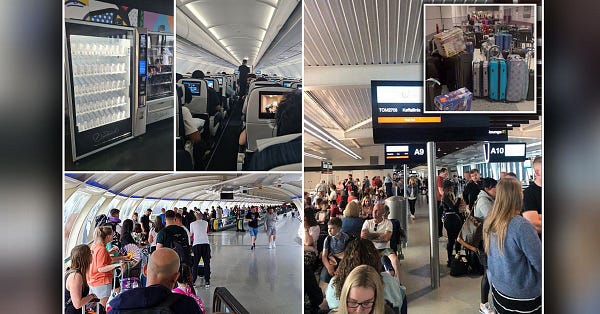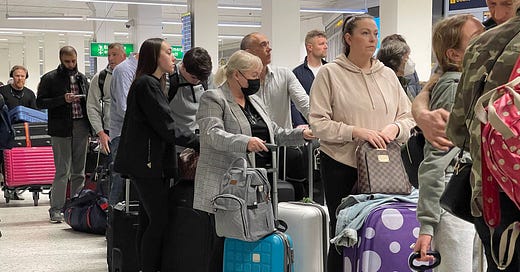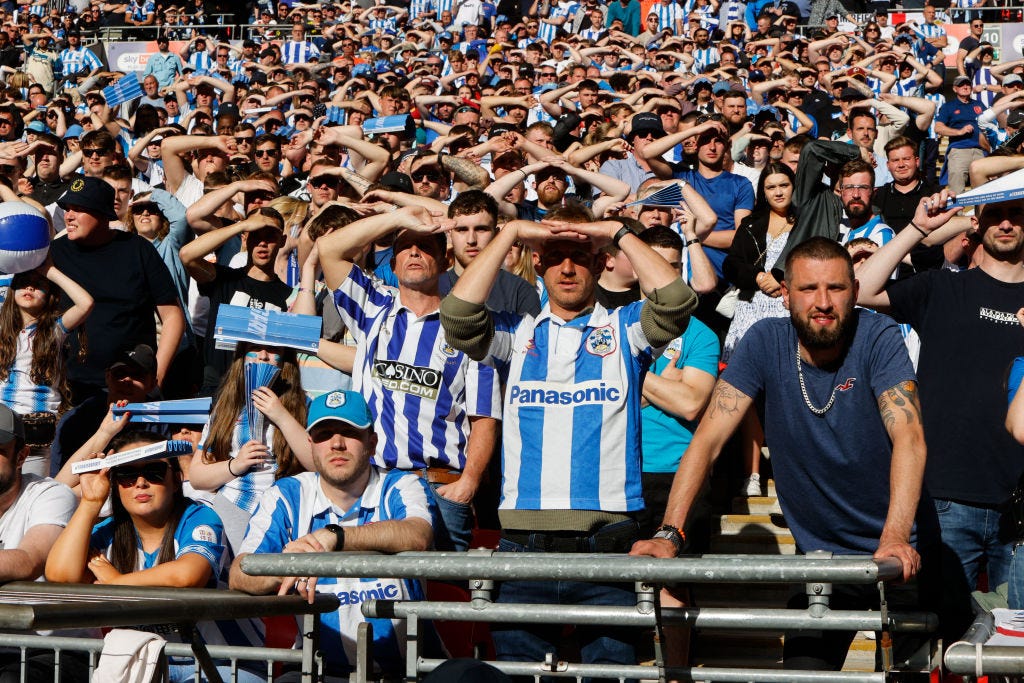

The transport system in the UK is breaking right now, particularly outside London. This is constantly coming up in my discussions with business leaders, contacts, and family outside the south-east. There is frustration and anger. The north-west of England seems to have it particularly tough. Disruption at Manchester Airport has simmered for weeks and continues. A strike by workers on the TransPennine Express rail service, whose network includes Manchester Airport, has exacerbated the problem.


The disruption stems from staff shortages at airports post-Covid, but airlines have also blamed IT issues, air traffic restrictions, and runway maintenance in the last week. Easyjet and TUI flights were hit at the weekend, with some cancelled at short-notice, and it was not just Manchester that suffered….

This strikes me as one of those stories that would be getting more traction if it was all happening in London. But the fall-out could have national implications. This is not just because of the disruption it will cause everyone travelling this week for half-term or the Platinum Jubilee celebrations (some of whom are travelling for the first time post-Covid), but because of what it means for the economy. The UK economy is slowing, consumer confidence is dropping, and none of this helps. Bloomberg has published an analysis this morning saying that the extra bank holiday for the Jubilee could knock half a percentage point off GDP in the second quarter. That is a short-term issue, but longer-term it should go without saying that the UK economy needs a functioning, modern transport network. For anyone arriving in the UK this week, this is a terrible advertisement for the country.
Housing market cools
The first real signs of the housing market cooling are now coming through in the data. Zoopla, the property website, has said this morning that properties are taking longer to sell than earlier in the year and more sellers are having to reduce their asking price. It said that a three-bedroom property outside London is now taking an average of 18 days to go under offer, compared to 16 in March (the trend is similar in London). Furthermore, one in 20 properties listed on Zoopla has had a price reduction, compared to one in 22 last month, with an average price reduction of 9 per cent.
I don’t intend to get into house prices much in this newsletter, I will leave that to the economists and industry experts. But I wanted to flag this today because it fits with anecdotal evidence I am hearing from inside the industry and, frankly, history. A rise in interest rates by the Bank of England tends to lead to a cooling of the housing market.
It’s important to say, this is a cooling of the market from a historic hot streak. House prices at the end of April were still 8.4 per cent higher than a year ago according to Zoopla’s research. The average price of a UK home stands at a record £250,200.
In a further sign of the positive long-term outlook for the residential property market, the San Francisco-based investor Inclusive Capital has announced today that it has tabled a £1.5 billion takeover bid for Countryside Partnerships, which specialises in residential-led regeneration projects. The board of Countryside is refusing to enter talks over the bid, Inclusive says. However, shares in Countryside were up 25 per cent on the back of the news, trading at around 298p per share, close to the proposed offer price of 295p a share.
Some breaking news…
We said in an earlier Off to Lunch that this could happen, but the Competition and Markets Authority has just announced it is investigating Morrisons’ rescue deal for McColl’s. The announcement is here. Some background is here. Remember, 16,000 jobs and 1,100 shops are at risk. This is a tricky situation for the CMA…
A chart that helps you understand the world
This is fascinating data which shows that below the headline inflation number there is a huge divergence in the price of key household products. Just look at that rise in the price of pasta over the last year. The date has been published by the Office for National Statistics, which describes it as “highly experimental research” based on scraping online data from supermarkets. I have said it before in this newsletter, but this is more evidence of how the ONS is trying to innovate and rethink how it presents economic data. The full report is here.
You should also read this
There are useful lessons for every business in the series The Times has done on the failings at Manchester United since Sir Alex Ferguson left in 2013. It’s interesting to me as a fan of the club but also as someone studying the success and failure of organisations. One of the reader comments below the first piece caught my eye. It’s by someone called bluearmyfaction, so presumably a Man City fan, but is nonetheless thought-provoking. “Man U are not a special and unique club. But one which had three major periods of success. One when Man City were forced to dismantle their team. One under the inspirational Busby. And one under the inspirational Ferguson.” The point is that Man United has been looking at things the wrong way around. Rather than looking at what has gone wrong since 2013 and considering its default position to be glory and success, it should be looking at what went right during its golden years and consider its default position to be mediocrity or worse. All businesses and organisations would be wise to follow that mantra… (Times, paywall)
Volvo is working on electric lorries that can travel 600 miles on a single charge (Telegraph)
Traffic jams can be solved by maths, according to an Israel tech firm working on artificial intelligence for traffic lights (France24)
Half of the weddings in Qatar and Saudi Arabia are between people who are related, according to this Economist article. That is one of the reasons that Qatar wants to become a world leader in genomics (The Economist, paywall)
Malcolm Gladwell on why one of his questions in a job interview is “Do you know how to drive a manual transmission car?” (Oh, MG)
And finally…
Commiserations to Huddersfield sports fans, whose extraordinary weekend did not go the way they hoped. On Saturday, Huddersfield Giants lost 16-14 to Wigan Warriors in the rugby league Challenge Cup final at the Tottenham Hotspur Stadium. On Sunday, Huddersfield Town lost 1-0 to Nottingham Forrest in the Championship play-off final at Wembley. Losing both games will have been tough to take for the thousands of fans who made the trip to London for the weekend. Personally, as a Wigan fan, I enjoyed the Challenge Cup final, particularly the performance of Jai Field, who scored a brilliant try and is one of the most exciting and electric players to watch in any sport at the moment….

If you want to read more about Field, I recommend this from rugby league journalist Aaron Bower at TXIIIRTEEN.
Thanks for reading. Off to Lunch will be back on Wednesday. If you want to contribute to the work of Off to Lunch, then please sign up for a paid subscription below. Alternatively, please just spread the word!
Graham






